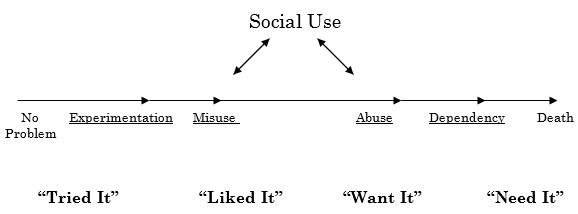DRUGS & ALCOHOL 101
A Parent Resource, presented by Eric Munson, CPP, ICPS
ADDICTION
What is it by definition?
- Addiction is an uncontrollable compulsion to repeat a behavior regardless of its negative consequences.
What can you be addicted to?
- Drugs/Alcohol
- Gambling
- Internet/phones/texting/social sites/gaming
- Sexual (pornography)
- Food
- Others
So what are the negative consequences of each?
| Drug addictions: |
| |
Relationships |
Family |
School |
|
Finances |
Legal |
Work |
|
Health |
|
|
| Gambling: |
|
Finances |
Family |
Relationships |
| |
Legal |
Work |
|
| Internet/electronics: |
| |
Relationships |
Time Management |
Work |
| |
Family |
Communication |
|
| Sexual (including pornography): |
| |
Relationships |
Family |
Finances |
| |
Legal |
Time |
|
| Food |
| |
Obesity |
Health |
Relationships |
How we get addicted?
The "Disease Progression" chart below shows the stages of addiction.

Who can get addicted?
- Anyone! Addictions truly do not discriminate, especially with drugs and alcohol.
- It is not a character flaw!
- In fact, 97% of alcoholics are employed
Some reasons why?
- Predisposed because of family history
- Family use and/or positive attitudes towards drugs
- Addictive personalities or tendencies
- Competitiveness (athletes or military)
- Need for the ‘adrenalin rush’
Research has not found any single cause for dependence. A combination of physiological (consistent with the normal functioning of an organism), psychological (mental or emotional state), and sociological (cultural and environmental) factors usually converge for a given person to become dependent.
Why do we get addicted?
- The central nervous system (CNS) acts as a switchboard or computer and sends messages to the appropriate system of the body: muscular, skeletal, circulatory, nervous, respiration, digestive, etc.
- The gateway to the central nervous system is something called the blood-brain barrier. This blocks certain substances such as toxins, viruses, certain neurotransmitters, and bacteria from the CNS.
- Drugs cross this barrier and stimulates or inhibits these neurotransmitters and releases them into the CNS.
- Adrenalin, Serotonin, Endorphins, and Dopamine are natural neurotransmitters that the body uses when scared or in athletic competition for example. These are good things, but certain drugs cause these chemicals to be improperly released or inhibit them from entering into the CNS.
For example:
- Stimulants – forces the release of large amounts of dopamine and ephedrine creating stimulating and exaggerating messages to and from the CNS, many times until they are depleted.
- Downers - inhibits the release of certain chemicals and helps block the neurotransmitters that would signal pain by dulling or weakening the signal.
- Psychedelics – stimulates neurotransmitters, but also confuses them, exaggerating some messages, distorting others, and even creates imaginary one, particularly visual and auditory images.
So after the use of these drugs, the body adapts to the various chemicals and it becomes tolerant of the drug, which in turn results in the user having to take more in order to get the same high.
Potentially, this can lead to addiction.